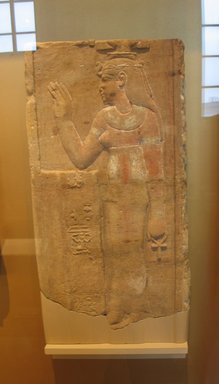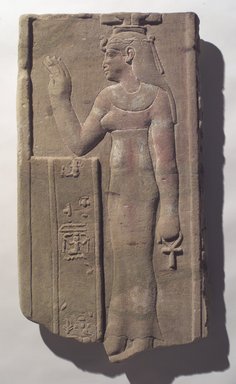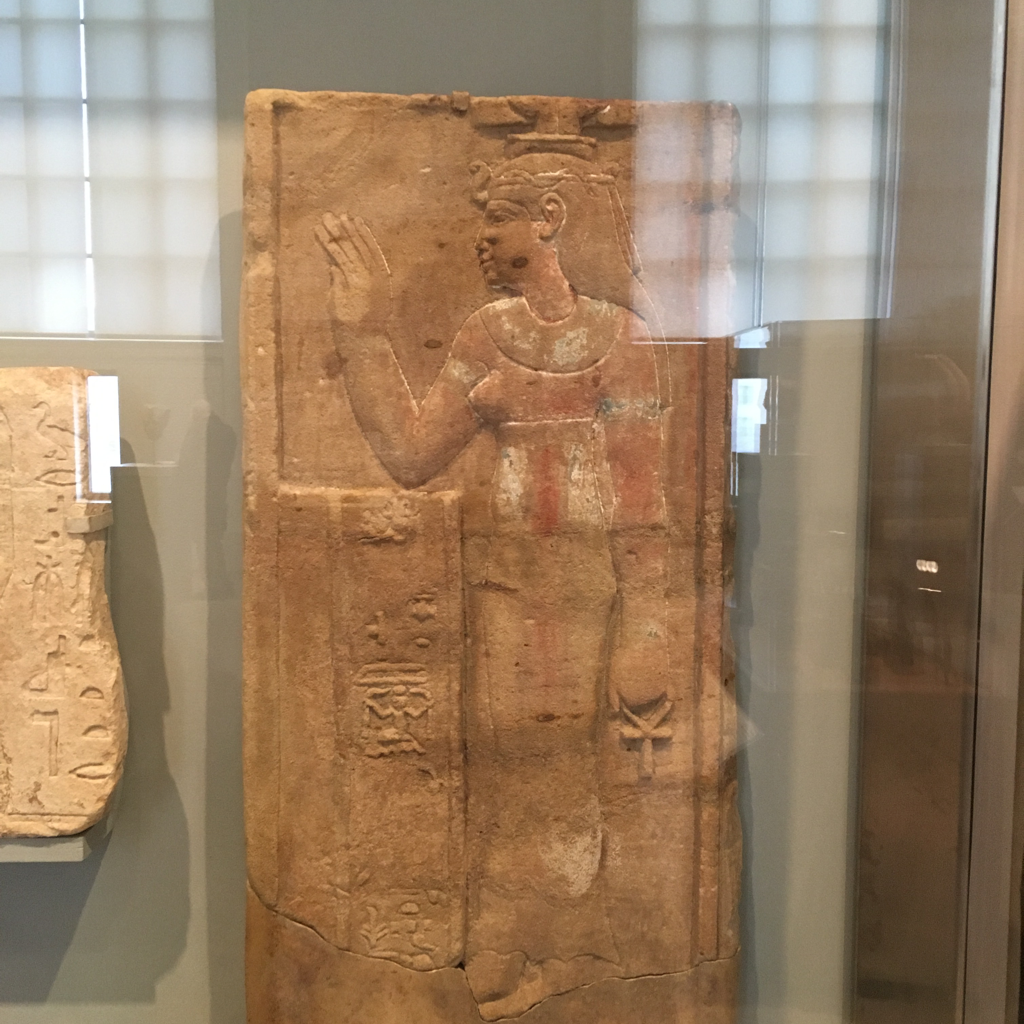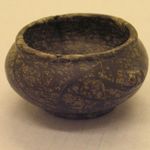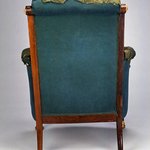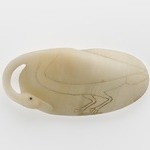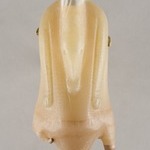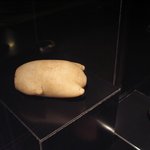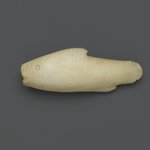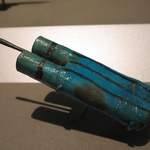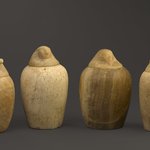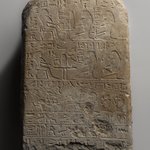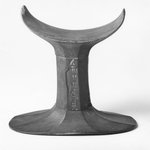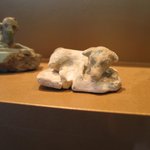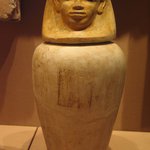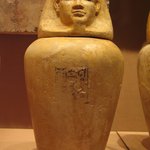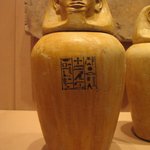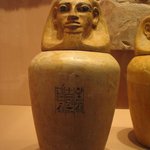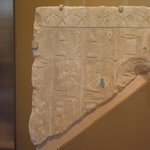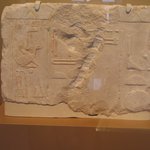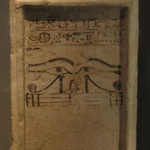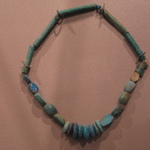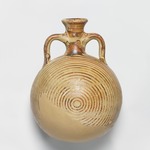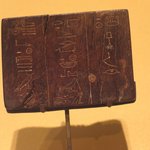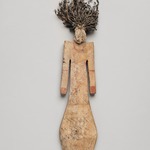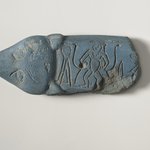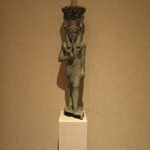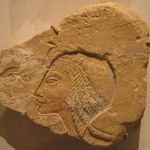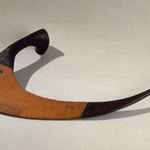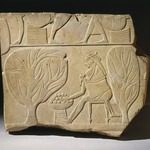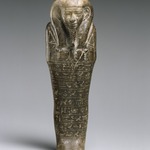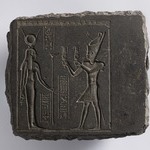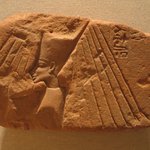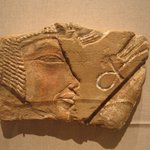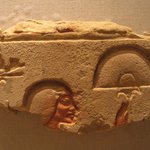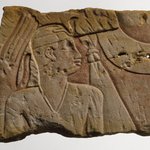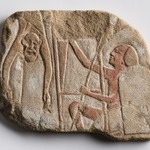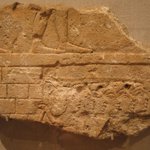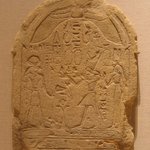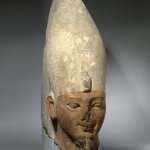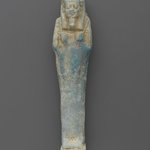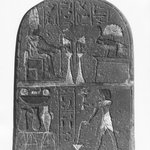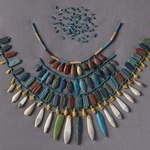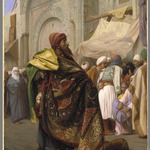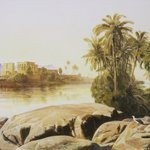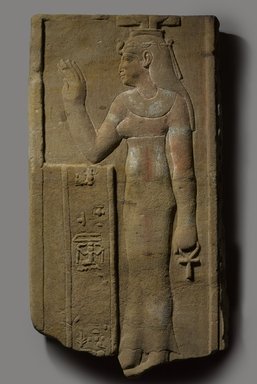

Raised Relief of a Goddess or Queen, ca. 45–41 B.C.E. Sandstone, pigment, 29 x 15 3/4 x 2 3/4in. (73.7 x 40 x 7cm). Brooklyn Museum, Charles Edwin Wilbour Fund, 1989.159. Creative Commons-BY (Photo: Brooklyn Museum, 1989.159_PS9.jpg)
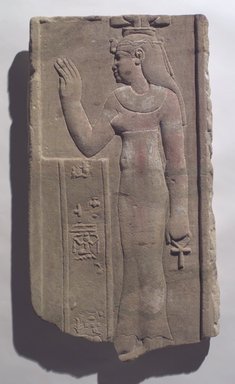
Raised Relief of a Goddess or Queen, ca. 45–41 B.C.E. Sandstone, pigment, 29 x 15 3/4 x 2 3/4in. (73.7 x 40 x 7cm). Brooklyn Museum, Charles Edwin Wilbour Fund, 1989.159. Creative Commons-BY (Photo: Brooklyn Museum, 1989.159_view1.jpg)
Raised Relief of a Goddess or Queen
Egyptian, Classical, Ancient Near Eastern Art
On View: Old Kingdom to 18th Dynasty, Egyptian Galleries, 3rd Floor
This work’s style of high, rounded relief and soft bodily proportions is characteristic of Ptolemaic art. The base of a crown is visible on the figure’s head along with a cobra at her forehead. She wears a long hairstyle and a dress that ends in a scalloped hem. One hand is raised, perhaps in worship of a divinity. The other hand holds the ankh-sign, the hieroglyph meaning “life.” The headgear, clothing, and hand gestures could characterize either a queen or a goddess. Since Ptolemaic queens were sometimes considered deities, this relief could represent both.
MEDIUM
Sandstone, pigment
DATES
ca. 45–41 B.C.E.
PERIOD
Ptolemaic Period
DIMENSIONS
29 x 15 3/4 x 2 3/4in. (73.7 x 40 x 7cm) (show scale)



COLLECTIONS
Egyptian, Classical, Ancient Near Eastern Art
ACCESSION NUMBER
1989.159
CREDIT LINE
Charles Edwin Wilbour Fund
CATALOGUE DESCRIPTION
Bold sunk relief in sandstone of a standing woman. The figure faces left with raised right arm, horizontal left arm holding a life-sign in hand. Rising from a modius atop a wig adorned with a fillet is the lower portion of a crown consisting of tall plumes fronted by cow's horns, and presumably, a solar disk. Around the fillet is coiled the body of a cobra whose head and spread hood rise before the figure's head. The figure wears a broad-collar necklace, represented in relief, and a tight dress starting just below the breasts and ending in a scalloped hemline. Remains of pigment indicate that the dress was painted blue with a central vertical panel of red. Areas of red pigment are also found on the figure's face, chest, and arms. Blue-green pigment indicates armlets and bracelets were painted on the figure. Before the figure is a partially preserved column of hieroglyphic text. Figure and text are framed at the side by raised border lines.
EXHIBITIONS
MUSEUM LOCATION
This item is on view in Old Kingdom to 18th Dynasty, Egyptian Galleries, 3rd Floor
CAPTION
Raised Relief of a Goddess or Queen, ca. 45–41 B.C.E. Sandstone, pigment, 29 x 15 3/4 x 2 3/4in. (73.7 x 40 x 7cm). Brooklyn Museum, Charles Edwin Wilbour Fund, 1989.159. Creative Commons-BY (Photo: Brooklyn Museum, 1989.159_PS9.jpg)
IMAGE
overall, 1989.159_PS9.jpg. Brooklyn Museum photograph, 2015
"CUR" at the beginning of an image file name means that the image was created by a curatorial staff member. These study images may be digital point-and-shoot photographs, when we don\'t yet have high-quality studio photography, or they may be scans of older negatives, slides, or photographic prints, providing historical documentation of the object.
RIGHTS STATEMENT
Creative Commons-BY
You may download and use Brooklyn Museum images of this three-dimensional work in accordance with a Creative Commons license. Fair use, as understood under the United States Copyright Act, may also apply.
Please include caption information from this page and credit the Brooklyn Museum. If you need a high resolution file, please fill out our online application form (charges apply).
For further information about copyright, we recommend resources at the United States Library of Congress, Cornell University, Copyright and Cultural Institutions: Guidelines for U.S. Libraries, Archives, and Museums, and Copyright Watch.
For more information about the Museum's rights project, including how rights types are assigned, please see our blog posts on copyright.
If you have any information regarding this work and rights to it, please contact copyright@brooklynmuseum.org.
RECORD COMPLETENESS
Not every record you will find here is complete. More information is available for some works than for others, and some entries have been updated more recently. Records are frequently reviewed and revised, and we welcome any additional information you might have.
